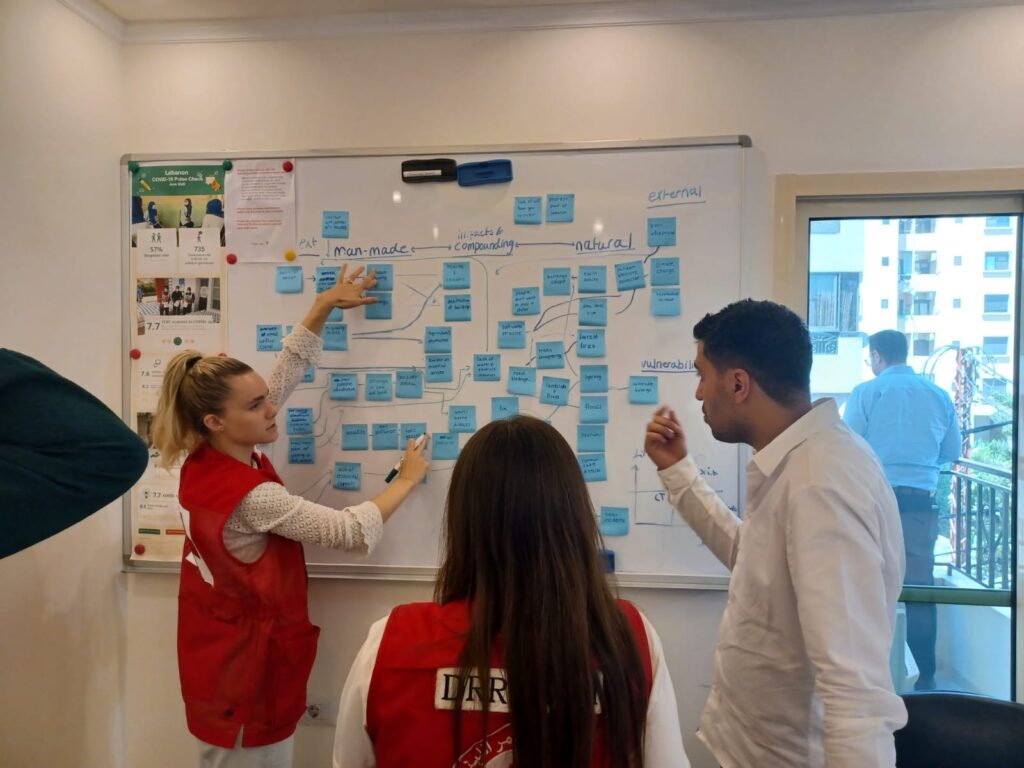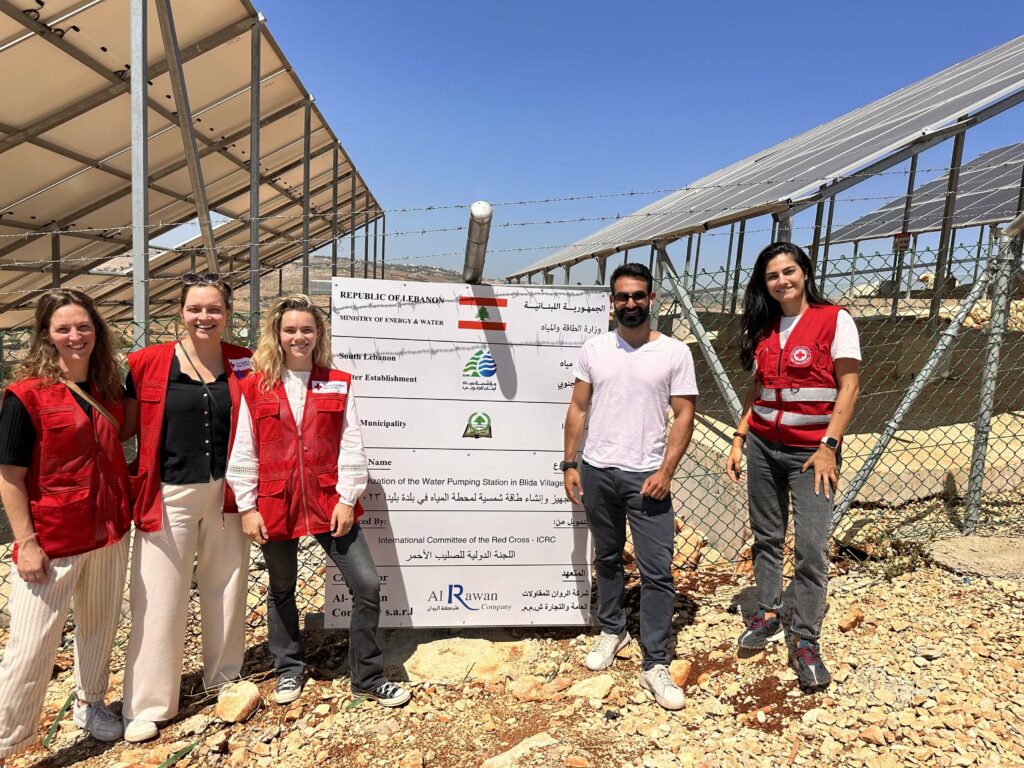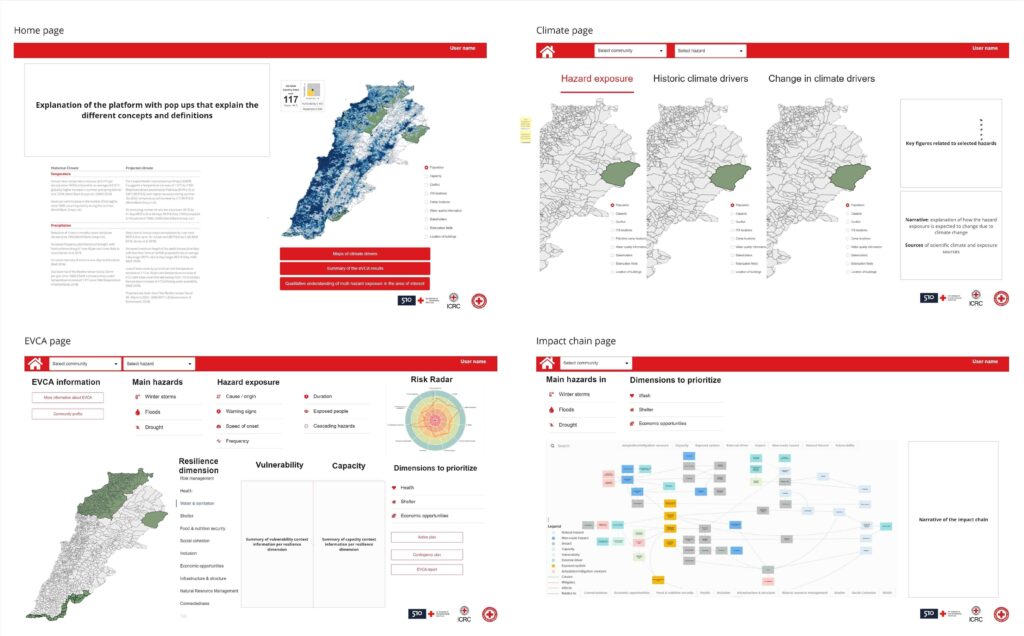Lebanon is no stranger to compounding crises. The country has been highly influenced by protracted regional conflict, and consequently hosts a large refugee population. On top of an already fragile socio-economic environment, exacerbated by the explosion in the port of its capital Beirut in 2020 and the COVID-19 pandemic, climate change is also affecting the Lebanese landscape. Its progressively hot, dry summers and cool, rainy winters have increased the risk of disasters such as drought, wildfires, winter storms and floods occurring more frequently and with more severity.
Amid such complex crises, humanitarian organizations face the daunting task of providing timely aid to vulnerable communities in conflict-ridden areas while adapting to ever-changing climate-induced threats. In response, the International Committee of the Red Cross (ICRC) launched a project to better factor in climate-related risks in decision-making processes in Lebanon. This would allow the ICRC, working closely with the Lebanese Red Cross, to improve living conditions for vulnerable communities in multi-hazard settings, with a focus on mitigating climate and environmental degradation risks, as well as ensuring access to safe water. Jointly, the Lebanese Red Cross, ICRC, the Red Cross Red Crescent Climate Centre, and 510, the data and digital initiative of the Netherlands Red Cross, are creating a digital platform comprising qualitative and quantitative information on climate change and community resilience. The platform supports decision makers in making risk-informed decisions and reducing climate-related risks for vulnerable people and infrastructure.

The key to creating a tool that is user-friendly and effective in anticipating the needs of communities in a targeted way, is creating a sense of ownership through collaboration. This is why our 510 team played a facilitating role in organizing co-design sessions towards developing this platform with participants from the Lebanese Red Cross, the ICRC, and the Climate Centre, ensuring that all relevant parties from the Red Cross Red Crescent Movement are actively involved in the project. Rooted in mutual support and with a focus on local ownership, the Lebanese Red Cross’ GIS team is taking the lead in building the platform as its owner and host, with the ICRC as implementing partner, and the Climate Centre providing technical advice and support on climate-related data.
“In our ongoing collaboration with 510, we have witnessed the invaluable synergy of technical expertise and effective communication. Through exceptional support and unwavering dedication to the advancement of our project, they are maintaining our project’s course and ensuring that we make well-informed, data-driven decisions.”
Lebanese Red Cross employee working in Disaster Risk Reduction (GIS team)
To facilitate the conversations around climate in conflict settings between the three entities and gain a deeper understanding of the needs, hazards and vulnerabilities in individual areas, as well as mitigation measures currently undertaken by the Lebanese Red Cross and the ICRC, the 510 team embarked on a visit to Lebanon in July 2023. There, the Lebanese Red Cross and our team co-conducted workshops, visited ICRC projects such as water towers and solarization plants, and engaged in focus group discussions with stakeholders from multiple sectors, from local authorities to NGOs and academia. Upon the visits to some of the most vulnerable areas, they uncovered a diverse spectrum of challenges faced by communities to varying degrees, including drought, wind, snowstorms, and conflict-related issues. It quickly became clear that a targeted approach was needed to analyze these diverse multi-hazard risks across Lebanon.
“In dialogue with our Movement partners, we learned that the human factor cannot be disregarded. A complete picture about the concerned areas was needed to improve timely and data-driven decision making, and to ensure that the Lebanese Red Cross and the ICRC adopt a project strategy that works for specific communities.”
Marijke Panis, Water & Landscape Advisor at 510

At the core of this project and visit was the development of a platform which combines qualitative and quantitative information to provide a comprehensive overview of climate hazard exposure, vulnerabilities, and community capacities. The platform showcases the power of partnership among Red Cross Red Crescent Movement partners by highlighting the key features, vulnerabilities and potential mitigation measures that shall be enhanced to achieve a more disaster-resilient community.
The components of the platform are the following:
- Climate Understanding: A comprehensive climate profile of the country sheds light on the evolving climate patterns and their impacts on hazard frequency and severity. This knowledge is essential for collective decision-making in determining preparedness and disaster risk reduction activities.
- Enhanced Vulnerability and Capacity Assessment (EVCA): The EVCA component allows Movement partners and relevant stakeholders to access pre-existing community-based disaster risk management reports, hazard exposure maps, risk scores, and relevant tools for fostering a deeper understanding of vulnerabilities and capacities within local communities.
- Multi-Hazard Assessment: The Multi-Hazard Assessment pictures a multitude of sources and triangulation of data in the form of impact chains per focus region. The impact chains include scientific literature, contributing to a holistic understanding of how various hazards and vulnerabilities interact and potentially have compounding effects. It enables Movement partners to comprehend complex risk dynamics at a glance.

“Knowing if villages have previously encountered a natural hazard, supported by statistics and characteristics, is useful information that will give us an idea about what kinds of projects to implement to mitigate those hazards in the future.”
ICRC employee who participated in 510’s co-design sessions of the platform
Creating this platform has required a meticulous integration of data and the development of robust infrastructure. The continuous collaboration between 510, and importantly the Lebanese Red Cross which provided the data to feed the platform, ensures flexibility to accommodate future updates and improvements of the tool. Accessibility remains a focal point, with plans to make the platform available in both English and Arabic to ensure the inclusion of local communities. The platform will also be user-tested and refined regularly to keep meeting the specific needs of the communities it serves, as well as providing them with important knowledge.
In a world where crises continually evolve, this joint initiative exemplifies the strength and adaptability of the Red Cross Red Crescent Movement. By harnessing the power of data and collaborative innovation, the Lebanese Red Cross, the ICRC, the Red Cross Red Crescent Climate Centre, and we at 510 are jointly working to bring hope to those enduring simultaneous climate risks and adversity in conflict zones.
We want to hear from you!
Are you interested in hearing more about the project or the platform? Please reach out to:
Thematic Lead, Water and Landscape: Marijke Panis mpanis@redcross.nl